ENGT5115 - Biofuels, Biodiversity, and the Future of Sustainability
VerifiedAdded on 2023/04/21
|21
|6153
|53
Essay
AI Summary
This essay examines the impact of biofuels on biodiversity and the pursuit of a sustainable future, addressing the environmental concerns associated with fossil fuels and advocating for biofuel adoption. It analyzes research papers and journals to assess the importance of biofuels and the negative consequences of fossil fuels, employing a qualitative methodology. The analysis revolves around three core themes derived from research objectives, thoroughly exploring concerns about biofuels, their effect on biodiversity, and their role in sustainable development. Ethical considerations are adhered to throughout the research process, ensuring transparency and data security, ultimately highlighting biofuels as a viable alternative for a sustainable future.
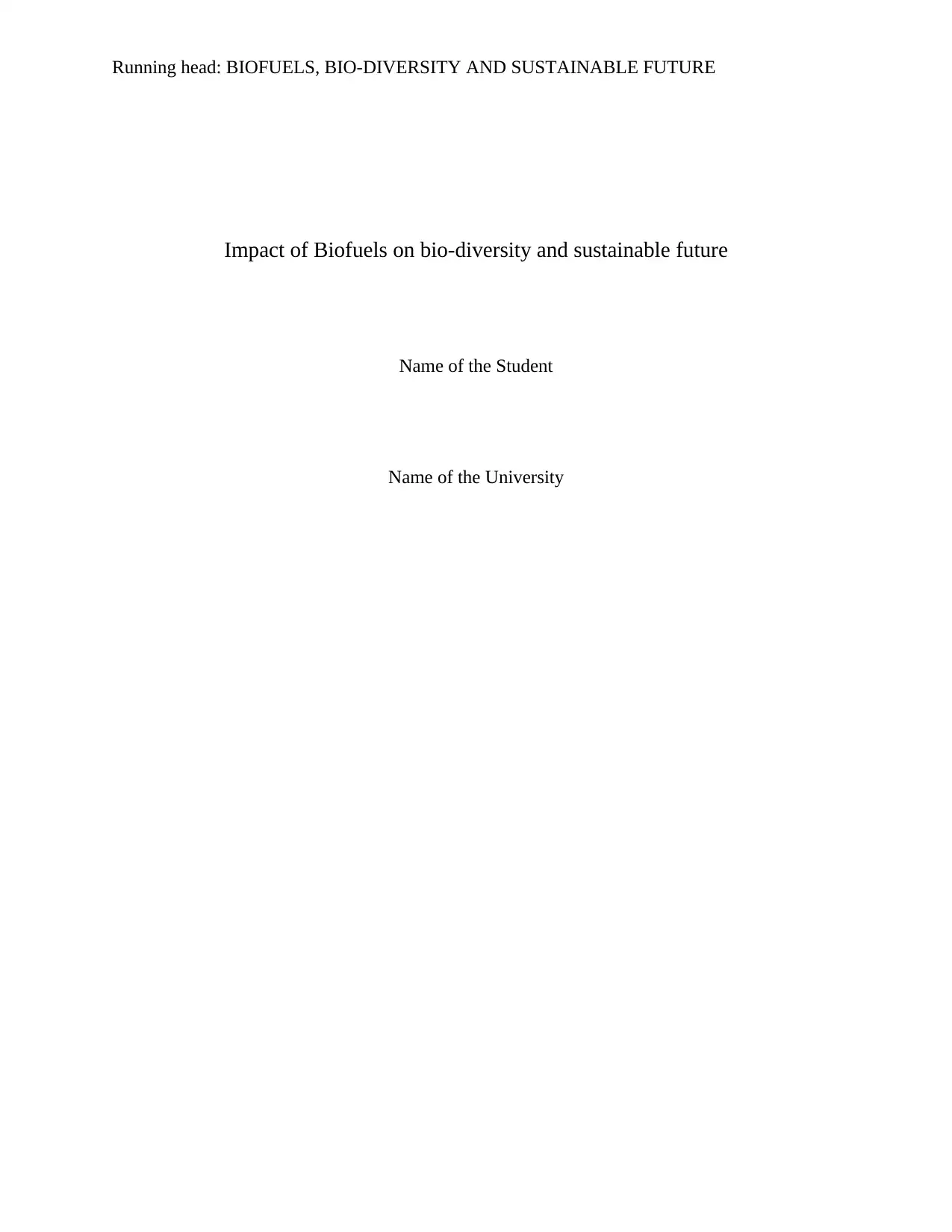
Running head: BIOFUELS, BIO-DIVERSITY AND SUSTAINABLE FUTURE
Impact of Biofuels on bio-diversity and sustainable future
Name of the Student
Name of the University
Impact of Biofuels on bio-diversity and sustainable future
Name of the Student
Name of the University
Paraphrase This Document
Need a fresh take? Get an instant paraphrase of this document with our AI Paraphraser
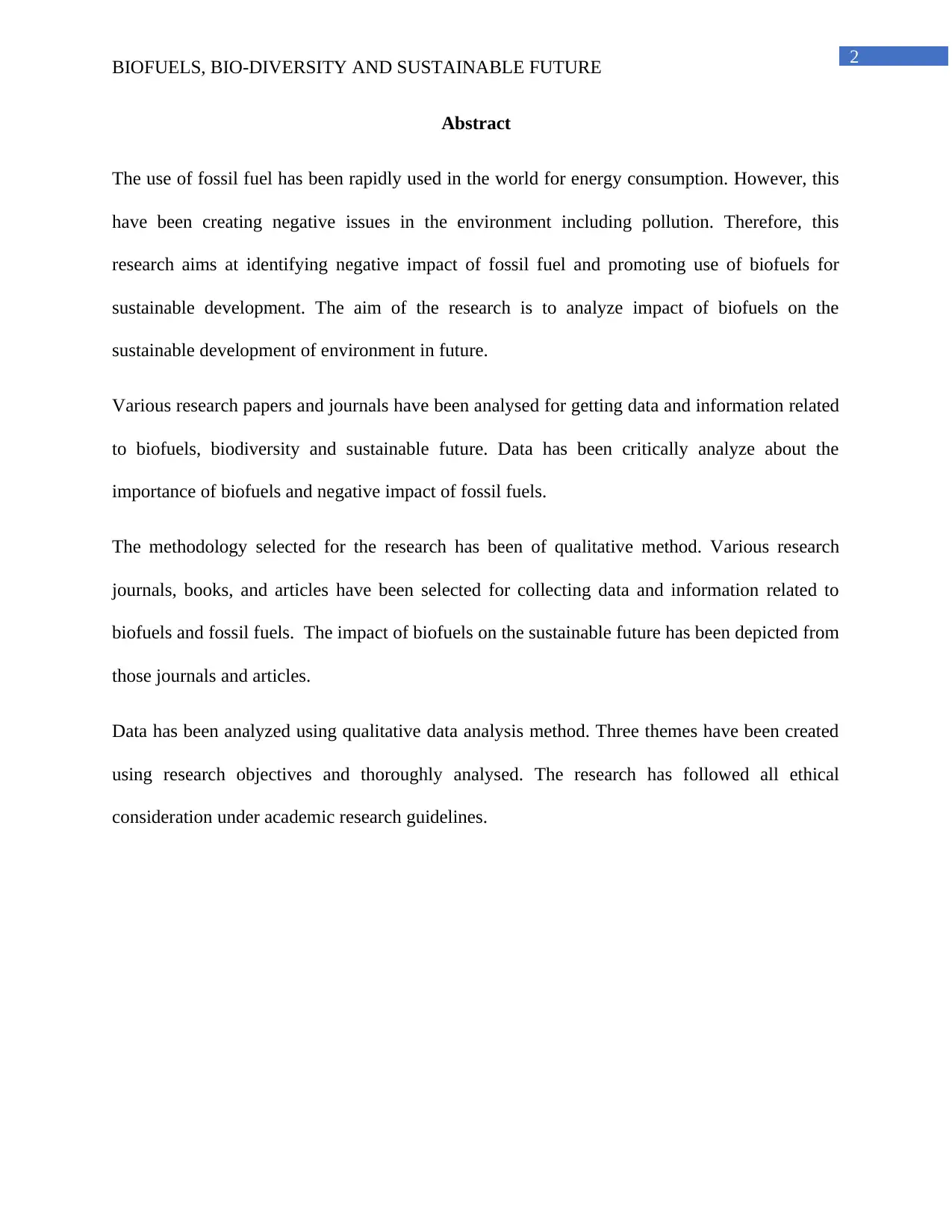
2
BIOFUELS, BIO-DIVERSITY AND SUSTAINABLE FUTURE
Abstract
The use of fossil fuel has been rapidly used in the world for energy consumption. However, this
have been creating negative issues in the environment including pollution. Therefore, this
research aims at identifying negative impact of fossil fuel and promoting use of biofuels for
sustainable development. The aim of the research is to analyze impact of biofuels on the
sustainable development of environment in future.
Various research papers and journals have been analysed for getting data and information related
to biofuels, biodiversity and sustainable future. Data has been critically analyze about the
importance of biofuels and negative impact of fossil fuels.
The methodology selected for the research has been of qualitative method. Various research
journals, books, and articles have been selected for collecting data and information related to
biofuels and fossil fuels. The impact of biofuels on the sustainable future has been depicted from
those journals and articles.
Data has been analyzed using qualitative data analysis method. Three themes have been created
using research objectives and thoroughly analysed. The research has followed all ethical
consideration under academic research guidelines.
BIOFUELS, BIO-DIVERSITY AND SUSTAINABLE FUTURE
Abstract
The use of fossil fuel has been rapidly used in the world for energy consumption. However, this
have been creating negative issues in the environment including pollution. Therefore, this
research aims at identifying negative impact of fossil fuel and promoting use of biofuels for
sustainable development. The aim of the research is to analyze impact of biofuels on the
sustainable development of environment in future.
Various research papers and journals have been analysed for getting data and information related
to biofuels, biodiversity and sustainable future. Data has been critically analyze about the
importance of biofuels and negative impact of fossil fuels.
The methodology selected for the research has been of qualitative method. Various research
journals, books, and articles have been selected for collecting data and information related to
biofuels and fossil fuels. The impact of biofuels on the sustainable future has been depicted from
those journals and articles.
Data has been analyzed using qualitative data analysis method. Three themes have been created
using research objectives and thoroughly analysed. The research has followed all ethical
consideration under academic research guidelines.
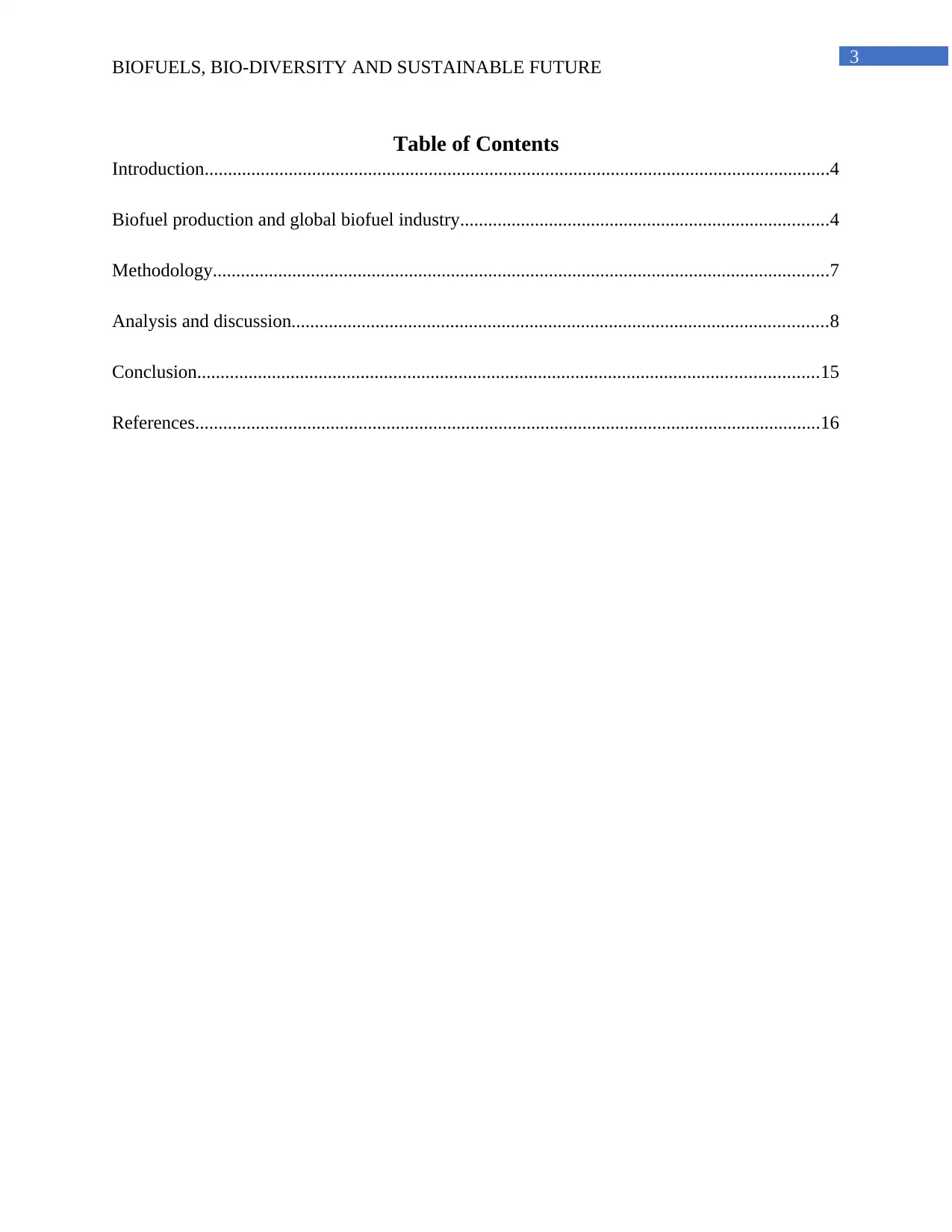
3
BIOFUELS, BIO-DIVERSITY AND SUSTAINABLE FUTURE
Table of Contents
Introduction......................................................................................................................................4
Biofuel production and global biofuel industry...............................................................................4
Methodology....................................................................................................................................7
Analysis and discussion...................................................................................................................8
Conclusion.....................................................................................................................................15
References......................................................................................................................................16
BIOFUELS, BIO-DIVERSITY AND SUSTAINABLE FUTURE
Table of Contents
Introduction......................................................................................................................................4
Biofuel production and global biofuel industry...............................................................................4
Methodology....................................................................................................................................7
Analysis and discussion...................................................................................................................8
Conclusion.....................................................................................................................................15
References......................................................................................................................................16
⊘ This is a preview!⊘
Do you want full access?
Subscribe today to unlock all pages.

Trusted by 1+ million students worldwide
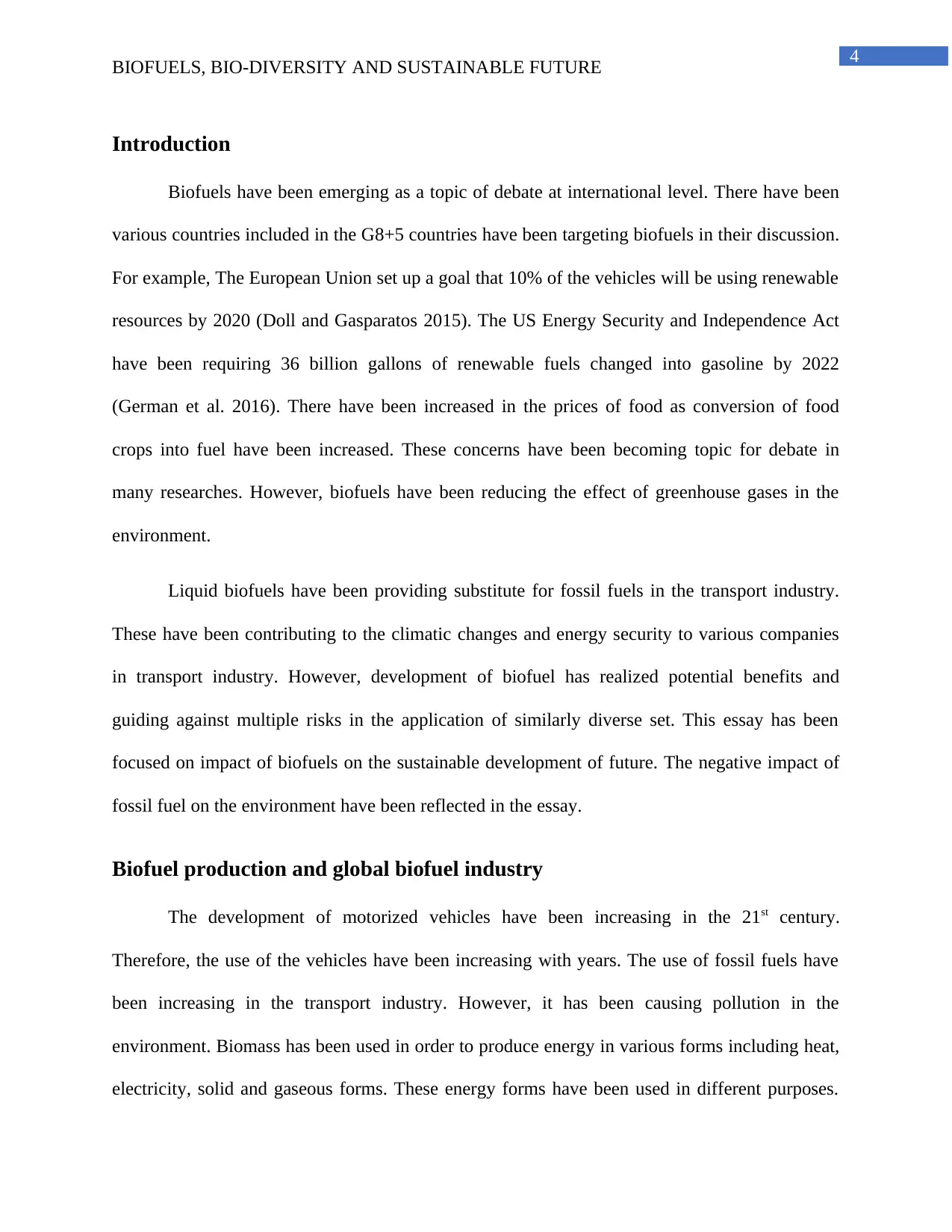
4
BIOFUELS, BIO-DIVERSITY AND SUSTAINABLE FUTURE
Introduction
Biofuels have been emerging as a topic of debate at international level. There have been
various countries included in the G8+5 countries have been targeting biofuels in their discussion.
For example, The European Union set up a goal that 10% of the vehicles will be using renewable
resources by 2020 (Doll and Gasparatos 2015). The US Energy Security and Independence Act
have been requiring 36 billion gallons of renewable fuels changed into gasoline by 2022
(German et al. 2016). There have been increased in the prices of food as conversion of food
crops into fuel have been increased. These concerns have been becoming topic for debate in
many researches. However, biofuels have been reducing the effect of greenhouse gases in the
environment.
Liquid biofuels have been providing substitute for fossil fuels in the transport industry.
These have been contributing to the climatic changes and energy security to various companies
in transport industry. However, development of biofuel has realized potential benefits and
guiding against multiple risks in the application of similarly diverse set. This essay has been
focused on impact of biofuels on the sustainable development of future. The negative impact of
fossil fuel on the environment have been reflected in the essay.
Biofuel production and global biofuel industry
The development of motorized vehicles have been increasing in the 21st century.
Therefore, the use of the vehicles have been increasing with years. The use of fossil fuels have
been increasing in the transport industry. However, it has been causing pollution in the
environment. Biomass has been used in order to produce energy in various forms including heat,
electricity, solid and gaseous forms. These energy forms have been used in different purposes.
BIOFUELS, BIO-DIVERSITY AND SUSTAINABLE FUTURE
Introduction
Biofuels have been emerging as a topic of debate at international level. There have been
various countries included in the G8+5 countries have been targeting biofuels in their discussion.
For example, The European Union set up a goal that 10% of the vehicles will be using renewable
resources by 2020 (Doll and Gasparatos 2015). The US Energy Security and Independence Act
have been requiring 36 billion gallons of renewable fuels changed into gasoline by 2022
(German et al. 2016). There have been increased in the prices of food as conversion of food
crops into fuel have been increased. These concerns have been becoming topic for debate in
many researches. However, biofuels have been reducing the effect of greenhouse gases in the
environment.
Liquid biofuels have been providing substitute for fossil fuels in the transport industry.
These have been contributing to the climatic changes and energy security to various companies
in transport industry. However, development of biofuel has realized potential benefits and
guiding against multiple risks in the application of similarly diverse set. This essay has been
focused on impact of biofuels on the sustainable development of future. The negative impact of
fossil fuel on the environment have been reflected in the essay.
Biofuel production and global biofuel industry
The development of motorized vehicles have been increasing in the 21st century.
Therefore, the use of the vehicles have been increasing with years. The use of fossil fuels have
been increasing in the transport industry. However, it has been causing pollution in the
environment. Biomass has been used in order to produce energy in various forms including heat,
electricity, solid and gaseous forms. These energy forms have been used in different purposes.
Paraphrase This Document
Need a fresh take? Get an instant paraphrase of this document with our AI Paraphraser
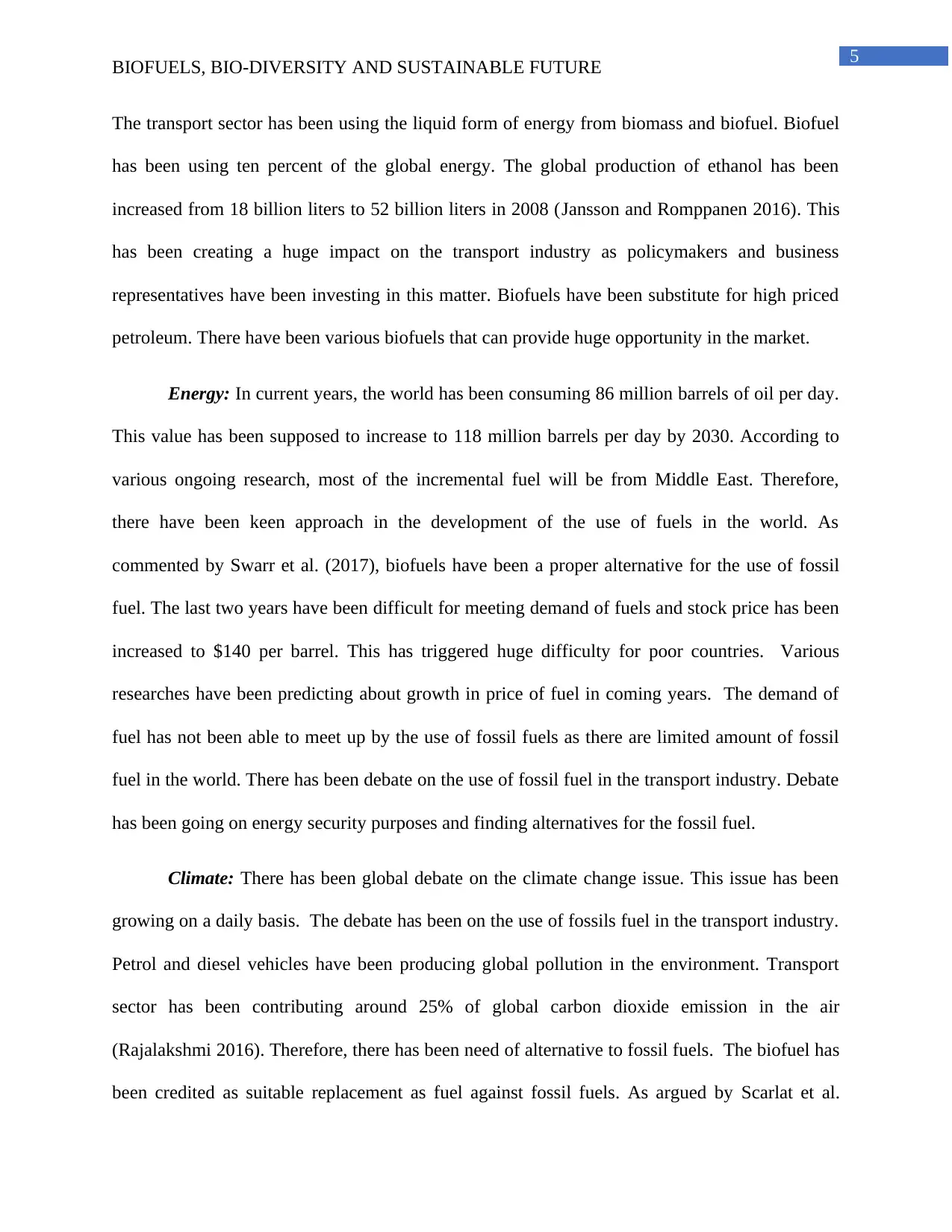
5
BIOFUELS, BIO-DIVERSITY AND SUSTAINABLE FUTURE
The transport sector has been using the liquid form of energy from biomass and biofuel. Biofuel
has been using ten percent of the global energy. The global production of ethanol has been
increased from 18 billion liters to 52 billion liters in 2008 (Jansson and Romppanen 2016). This
has been creating a huge impact on the transport industry as policymakers and business
representatives have been investing in this matter. Biofuels have been substitute for high priced
petroleum. There have been various biofuels that can provide huge opportunity in the market.
Energy: In current years, the world has been consuming 86 million barrels of oil per day.
This value has been supposed to increase to 118 million barrels per day by 2030. According to
various ongoing research, most of the incremental fuel will be from Middle East. Therefore,
there have been keen approach in the development of the use of fuels in the world. As
commented by Swarr et al. (2017), biofuels have been a proper alternative for the use of fossil
fuel. The last two years have been difficult for meeting demand of fuels and stock price has been
increased to $140 per barrel. This has triggered huge difficulty for poor countries. Various
researches have been predicting about growth in price of fuel in coming years. The demand of
fuel has not been able to meet up by the use of fossil fuels as there are limited amount of fossil
fuel in the world. There has been debate on the use of fossil fuel in the transport industry. Debate
has been going on energy security purposes and finding alternatives for the fossil fuel.
Climate: There has been global debate on the climate change issue. This issue has been
growing on a daily basis. The debate has been on the use of fossils fuel in the transport industry.
Petrol and diesel vehicles have been producing global pollution in the environment. Transport
sector has been contributing around 25% of global carbon dioxide emission in the air
(Rajalakshmi 2016). Therefore, there has been need of alternative to fossil fuels. The biofuel has
been credited as suitable replacement as fuel against fossil fuels. As argued by Scarlat et al.
BIOFUELS, BIO-DIVERSITY AND SUSTAINABLE FUTURE
The transport sector has been using the liquid form of energy from biomass and biofuel. Biofuel
has been using ten percent of the global energy. The global production of ethanol has been
increased from 18 billion liters to 52 billion liters in 2008 (Jansson and Romppanen 2016). This
has been creating a huge impact on the transport industry as policymakers and business
representatives have been investing in this matter. Biofuels have been substitute for high priced
petroleum. There have been various biofuels that can provide huge opportunity in the market.
Energy: In current years, the world has been consuming 86 million barrels of oil per day.
This value has been supposed to increase to 118 million barrels per day by 2030. According to
various ongoing research, most of the incremental fuel will be from Middle East. Therefore,
there have been keen approach in the development of the use of fuels in the world. As
commented by Swarr et al. (2017), biofuels have been a proper alternative for the use of fossil
fuel. The last two years have been difficult for meeting demand of fuels and stock price has been
increased to $140 per barrel. This has triggered huge difficulty for poor countries. Various
researches have been predicting about growth in price of fuel in coming years. The demand of
fuel has not been able to meet up by the use of fossil fuels as there are limited amount of fossil
fuel in the world. There has been debate on the use of fossil fuel in the transport industry. Debate
has been going on energy security purposes and finding alternatives for the fossil fuel.
Climate: There has been global debate on the climate change issue. This issue has been
growing on a daily basis. The debate has been on the use of fossils fuel in the transport industry.
Petrol and diesel vehicles have been producing global pollution in the environment. Transport
sector has been contributing around 25% of global carbon dioxide emission in the air
(Rajalakshmi 2016). Therefore, there has been need of alternative to fossil fuels. The biofuel has
been credited as suitable replacement as fuel against fossil fuels. As argued by Scarlat et al.
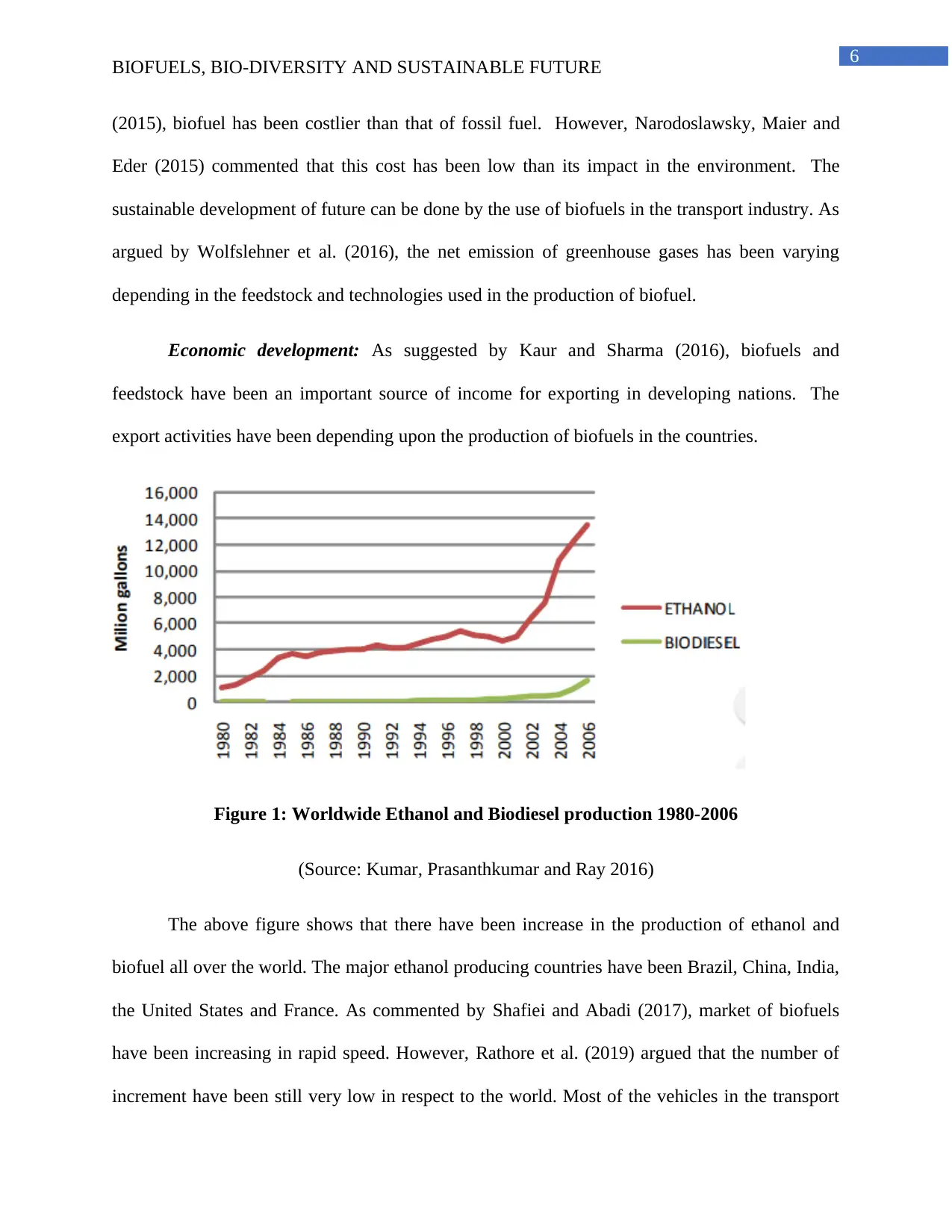
6
BIOFUELS, BIO-DIVERSITY AND SUSTAINABLE FUTURE
(2015), biofuel has been costlier than that of fossil fuel. However, Narodoslawsky, Maier and
Eder (2015) commented that this cost has been low than its impact in the environment. The
sustainable development of future can be done by the use of biofuels in the transport industry. As
argued by Wolfslehner et al. (2016), the net emission of greenhouse gases has been varying
depending in the feedstock and technologies used in the production of biofuel.
Economic development: As suggested by Kaur and Sharma (2016), biofuels and
feedstock have been an important source of income for exporting in developing nations. The
export activities have been depending upon the production of biofuels in the countries.
Figure 1: Worldwide Ethanol and Biodiesel production 1980-2006
(Source: Kumar, Prasanthkumar and Ray 2016)
The above figure shows that there have been increase in the production of ethanol and
biofuel all over the world. The major ethanol producing countries have been Brazil, China, India,
the United States and France. As commented by Shafiei and Abadi (2017), market of biofuels
have been increasing in rapid speed. However, Rathore et al. (2019) argued that the number of
increment have been still very low in respect to the world. Most of the vehicles in the transport
BIOFUELS, BIO-DIVERSITY AND SUSTAINABLE FUTURE
(2015), biofuel has been costlier than that of fossil fuel. However, Narodoslawsky, Maier and
Eder (2015) commented that this cost has been low than its impact in the environment. The
sustainable development of future can be done by the use of biofuels in the transport industry. As
argued by Wolfslehner et al. (2016), the net emission of greenhouse gases has been varying
depending in the feedstock and technologies used in the production of biofuel.
Economic development: As suggested by Kaur and Sharma (2016), biofuels and
feedstock have been an important source of income for exporting in developing nations. The
export activities have been depending upon the production of biofuels in the countries.
Figure 1: Worldwide Ethanol and Biodiesel production 1980-2006
(Source: Kumar, Prasanthkumar and Ray 2016)
The above figure shows that there have been increase in the production of ethanol and
biofuel all over the world. The major ethanol producing countries have been Brazil, China, India,
the United States and France. As commented by Shafiei and Abadi (2017), market of biofuels
have been increasing in rapid speed. However, Rathore et al. (2019) argued that the number of
increment have been still very low in respect to the world. Most of the vehicles in the transport
⊘ This is a preview!⊘
Do you want full access?
Subscribe today to unlock all pages.

Trusted by 1+ million students worldwide
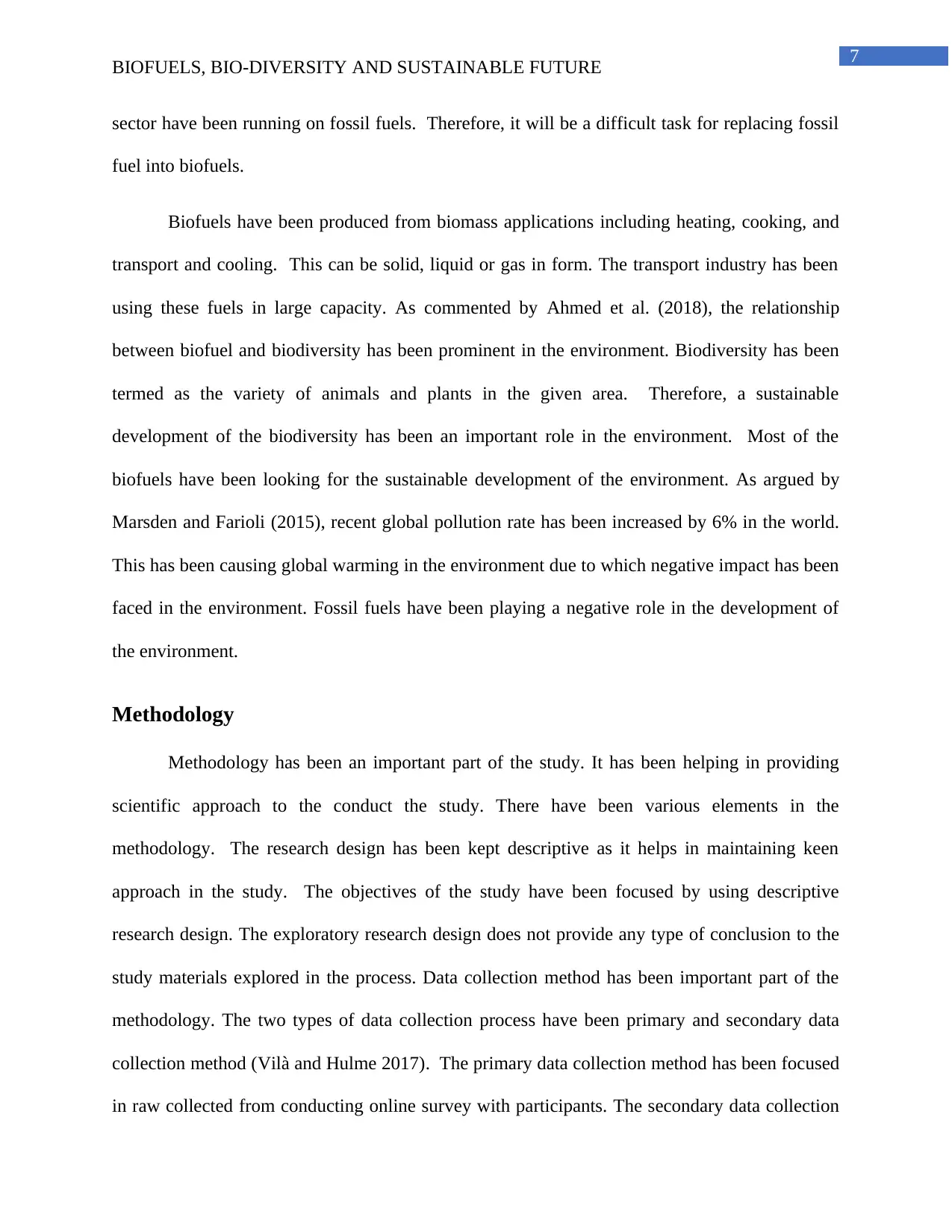
7
BIOFUELS, BIO-DIVERSITY AND SUSTAINABLE FUTURE
sector have been running on fossil fuels. Therefore, it will be a difficult task for replacing fossil
fuel into biofuels.
Biofuels have been produced from biomass applications including heating, cooking, and
transport and cooling. This can be solid, liquid or gas in form. The transport industry has been
using these fuels in large capacity. As commented by Ahmed et al. (2018), the relationship
between biofuel and biodiversity has been prominent in the environment. Biodiversity has been
termed as the variety of animals and plants in the given area. Therefore, a sustainable
development of the biodiversity has been an important role in the environment. Most of the
biofuels have been looking for the sustainable development of the environment. As argued by
Marsden and Farioli (2015), recent global pollution rate has been increased by 6% in the world.
This has been causing global warming in the environment due to which negative impact has been
faced in the environment. Fossil fuels have been playing a negative role in the development of
the environment.
Methodology
Methodology has been an important part of the study. It has been helping in providing
scientific approach to the conduct the study. There have been various elements in the
methodology. The research design has been kept descriptive as it helps in maintaining keen
approach in the study. The objectives of the study have been focused by using descriptive
research design. The exploratory research design does not provide any type of conclusion to the
study materials explored in the process. Data collection method has been important part of the
methodology. The two types of data collection process have been primary and secondary data
collection method (Vilà and Hulme 2017). The primary data collection method has been focused
in raw collected from conducting online survey with participants. The secondary data collection
BIOFUELS, BIO-DIVERSITY AND SUSTAINABLE FUTURE
sector have been running on fossil fuels. Therefore, it will be a difficult task for replacing fossil
fuel into biofuels.
Biofuels have been produced from biomass applications including heating, cooking, and
transport and cooling. This can be solid, liquid or gas in form. The transport industry has been
using these fuels in large capacity. As commented by Ahmed et al. (2018), the relationship
between biofuel and biodiversity has been prominent in the environment. Biodiversity has been
termed as the variety of animals and plants in the given area. Therefore, a sustainable
development of the biodiversity has been an important role in the environment. Most of the
biofuels have been looking for the sustainable development of the environment. As argued by
Marsden and Farioli (2015), recent global pollution rate has been increased by 6% in the world.
This has been causing global warming in the environment due to which negative impact has been
faced in the environment. Fossil fuels have been playing a negative role in the development of
the environment.
Methodology
Methodology has been an important part of the study. It has been helping in providing
scientific approach to the conduct the study. There have been various elements in the
methodology. The research design has been kept descriptive as it helps in maintaining keen
approach in the study. The objectives of the study have been focused by using descriptive
research design. The exploratory research design does not provide any type of conclusion to the
study materials explored in the process. Data collection method has been important part of the
methodology. The two types of data collection process have been primary and secondary data
collection method (Vilà and Hulme 2017). The primary data collection method has been focused
in raw collected from conducting online survey with participants. The secondary data collection
Paraphrase This Document
Need a fresh take? Get an instant paraphrase of this document with our AI Paraphraser
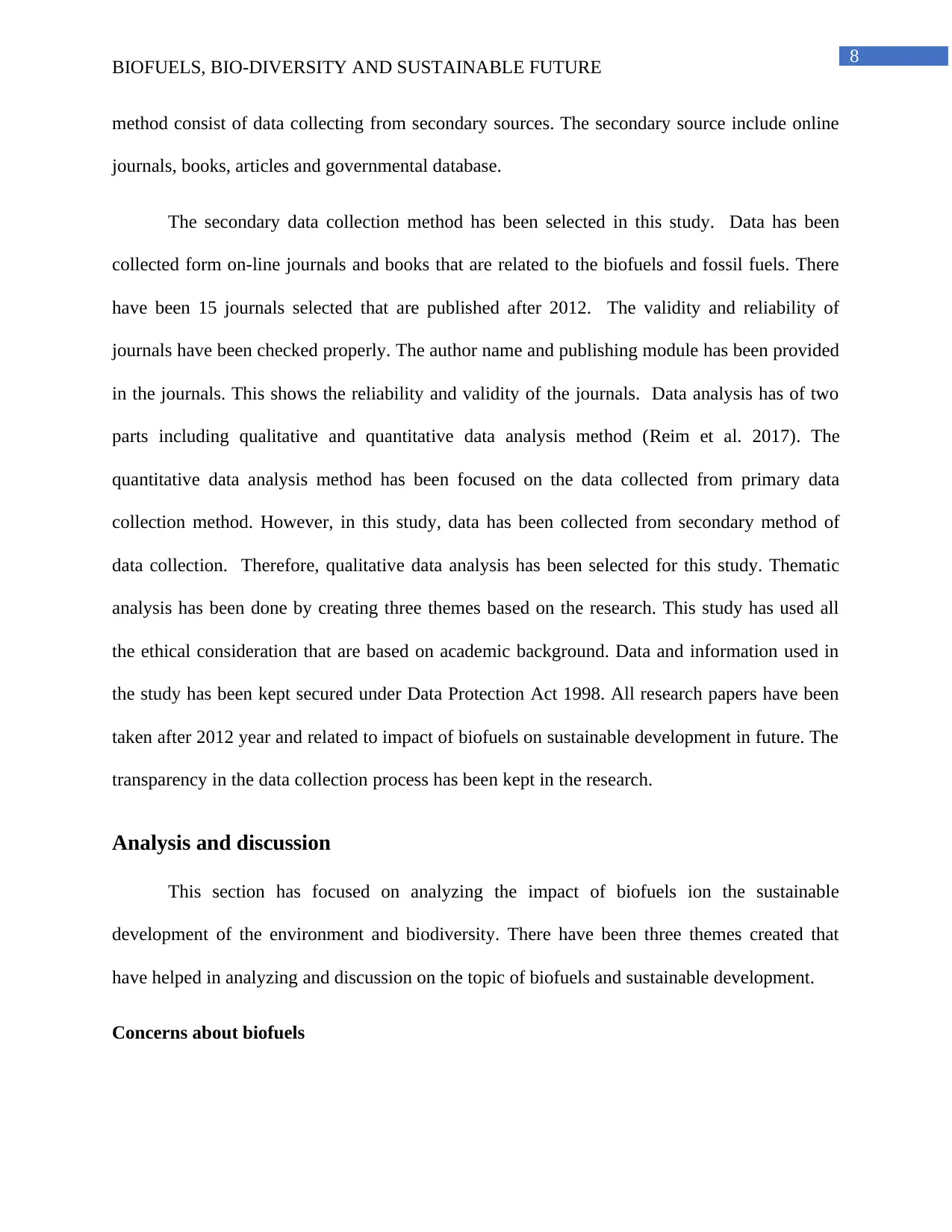
8
BIOFUELS, BIO-DIVERSITY AND SUSTAINABLE FUTURE
method consist of data collecting from secondary sources. The secondary source include online
journals, books, articles and governmental database.
The secondary data collection method has been selected in this study. Data has been
collected form on-line journals and books that are related to the biofuels and fossil fuels. There
have been 15 journals selected that are published after 2012. The validity and reliability of
journals have been checked properly. The author name and publishing module has been provided
in the journals. This shows the reliability and validity of the journals. Data analysis has of two
parts including qualitative and quantitative data analysis method (Reim et al. 2017). The
quantitative data analysis method has been focused on the data collected from primary data
collection method. However, in this study, data has been collected from secondary method of
data collection. Therefore, qualitative data analysis has been selected for this study. Thematic
analysis has been done by creating three themes based on the research. This study has used all
the ethical consideration that are based on academic background. Data and information used in
the study has been kept secured under Data Protection Act 1998. All research papers have been
taken after 2012 year and related to impact of biofuels on sustainable development in future. The
transparency in the data collection process has been kept in the research.
Analysis and discussion
This section has focused on analyzing the impact of biofuels ion the sustainable
development of the environment and biodiversity. There have been three themes created that
have helped in analyzing and discussion on the topic of biofuels and sustainable development.
Concerns about biofuels
BIOFUELS, BIO-DIVERSITY AND SUSTAINABLE FUTURE
method consist of data collecting from secondary sources. The secondary source include online
journals, books, articles and governmental database.
The secondary data collection method has been selected in this study. Data has been
collected form on-line journals and books that are related to the biofuels and fossil fuels. There
have been 15 journals selected that are published after 2012. The validity and reliability of
journals have been checked properly. The author name and publishing module has been provided
in the journals. This shows the reliability and validity of the journals. Data analysis has of two
parts including qualitative and quantitative data analysis method (Reim et al. 2017). The
quantitative data analysis method has been focused on the data collected from primary data
collection method. However, in this study, data has been collected from secondary method of
data collection. Therefore, qualitative data analysis has been selected for this study. Thematic
analysis has been done by creating three themes based on the research. This study has used all
the ethical consideration that are based on academic background. Data and information used in
the study has been kept secured under Data Protection Act 1998. All research papers have been
taken after 2012 year and related to impact of biofuels on sustainable development in future. The
transparency in the data collection process has been kept in the research.
Analysis and discussion
This section has focused on analyzing the impact of biofuels ion the sustainable
development of the environment and biodiversity. There have been three themes created that
have helped in analyzing and discussion on the topic of biofuels and sustainable development.
Concerns about biofuels
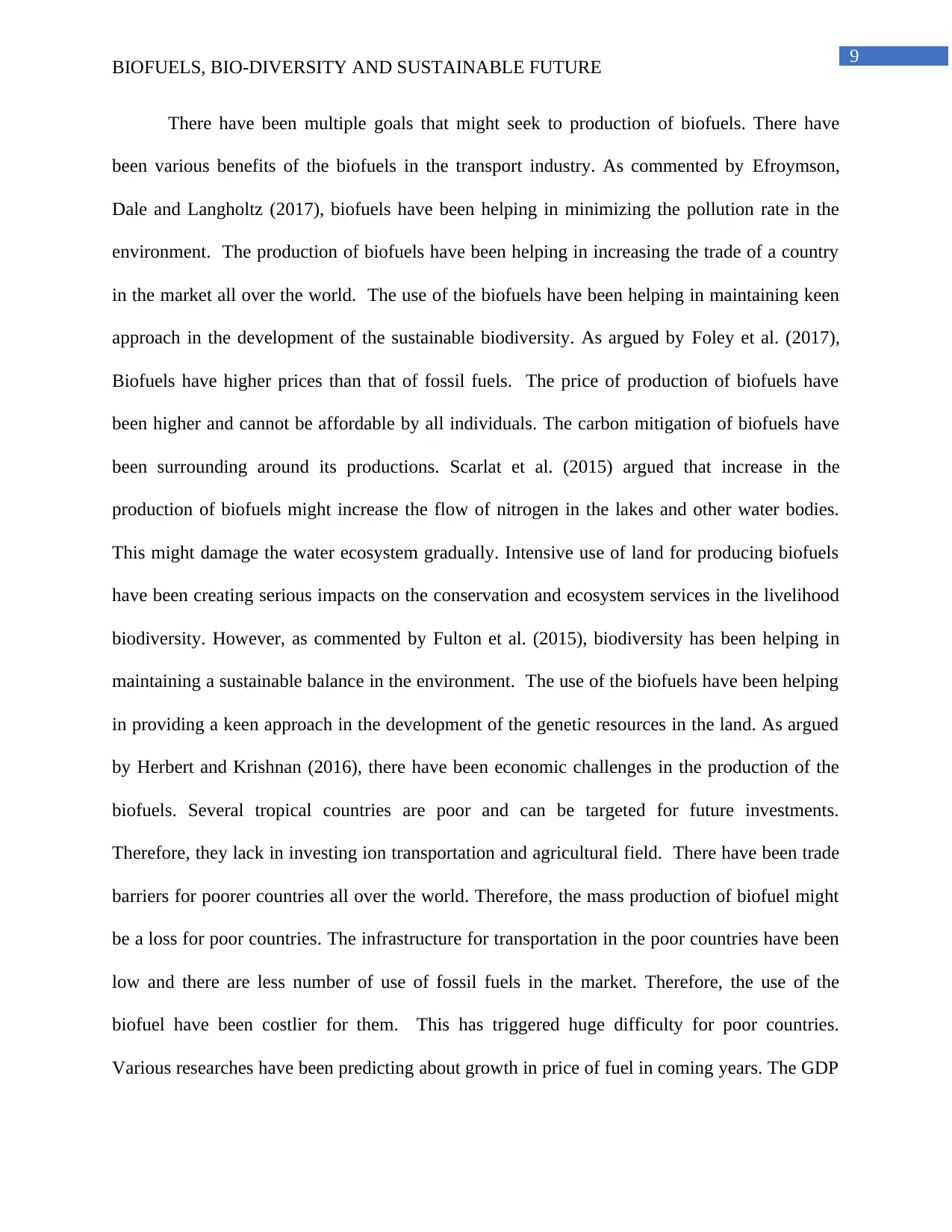
9
BIOFUELS, BIO-DIVERSITY AND SUSTAINABLE FUTURE
There have been multiple goals that might seek to production of biofuels. There have
been various benefits of the biofuels in the transport industry. As commented by Efroymson,
Dale and Langholtz (2017), biofuels have been helping in minimizing the pollution rate in the
environment. The production of biofuels have been helping in increasing the trade of a country
in the market all over the world. The use of the biofuels have been helping in maintaining keen
approach in the development of the sustainable biodiversity. As argued by Foley et al. (2017),
Biofuels have higher prices than that of fossil fuels. The price of production of biofuels have
been higher and cannot be affordable by all individuals. The carbon mitigation of biofuels have
been surrounding around its productions. Scarlat et al. (2015) argued that increase in the
production of biofuels might increase the flow of nitrogen in the lakes and other water bodies.
This might damage the water ecosystem gradually. Intensive use of land for producing biofuels
have been creating serious impacts on the conservation and ecosystem services in the livelihood
biodiversity. However, as commented by Fulton et al. (2015), biodiversity has been helping in
maintaining a sustainable balance in the environment. The use of the biofuels have been helping
in providing a keen approach in the development of the genetic resources in the land. As argued
by Herbert and Krishnan (2016), there have been economic challenges in the production of the
biofuels. Several tropical countries are poor and can be targeted for future investments.
Therefore, they lack in investing ion transportation and agricultural field. There have been trade
barriers for poorer countries all over the world. Therefore, the mass production of biofuel might
be a loss for poor countries. The infrastructure for transportation in the poor countries have been
low and there are less number of use of fossil fuels in the market. Therefore, the use of the
biofuel have been costlier for them. This has triggered huge difficulty for poor countries.
Various researches have been predicting about growth in price of fuel in coming years. The GDP
BIOFUELS, BIO-DIVERSITY AND SUSTAINABLE FUTURE
There have been multiple goals that might seek to production of biofuels. There have
been various benefits of the biofuels in the transport industry. As commented by Efroymson,
Dale and Langholtz (2017), biofuels have been helping in minimizing the pollution rate in the
environment. The production of biofuels have been helping in increasing the trade of a country
in the market all over the world. The use of the biofuels have been helping in maintaining keen
approach in the development of the sustainable biodiversity. As argued by Foley et al. (2017),
Biofuels have higher prices than that of fossil fuels. The price of production of biofuels have
been higher and cannot be affordable by all individuals. The carbon mitigation of biofuels have
been surrounding around its productions. Scarlat et al. (2015) argued that increase in the
production of biofuels might increase the flow of nitrogen in the lakes and other water bodies.
This might damage the water ecosystem gradually. Intensive use of land for producing biofuels
have been creating serious impacts on the conservation and ecosystem services in the livelihood
biodiversity. However, as commented by Fulton et al. (2015), biodiversity has been helping in
maintaining a sustainable balance in the environment. The use of the biofuels have been helping
in providing a keen approach in the development of the genetic resources in the land. As argued
by Herbert and Krishnan (2016), there have been economic challenges in the production of the
biofuels. Several tropical countries are poor and can be targeted for future investments.
Therefore, they lack in investing ion transportation and agricultural field. There have been trade
barriers for poorer countries all over the world. Therefore, the mass production of biofuel might
be a loss for poor countries. The infrastructure for transportation in the poor countries have been
low and there are less number of use of fossil fuels in the market. Therefore, the use of the
biofuel have been costlier for them. This has triggered huge difficulty for poor countries.
Various researches have been predicting about growth in price of fuel in coming years. The GDP
⊘ This is a preview!⊘
Do you want full access?
Subscribe today to unlock all pages.

Trusted by 1+ million students worldwide
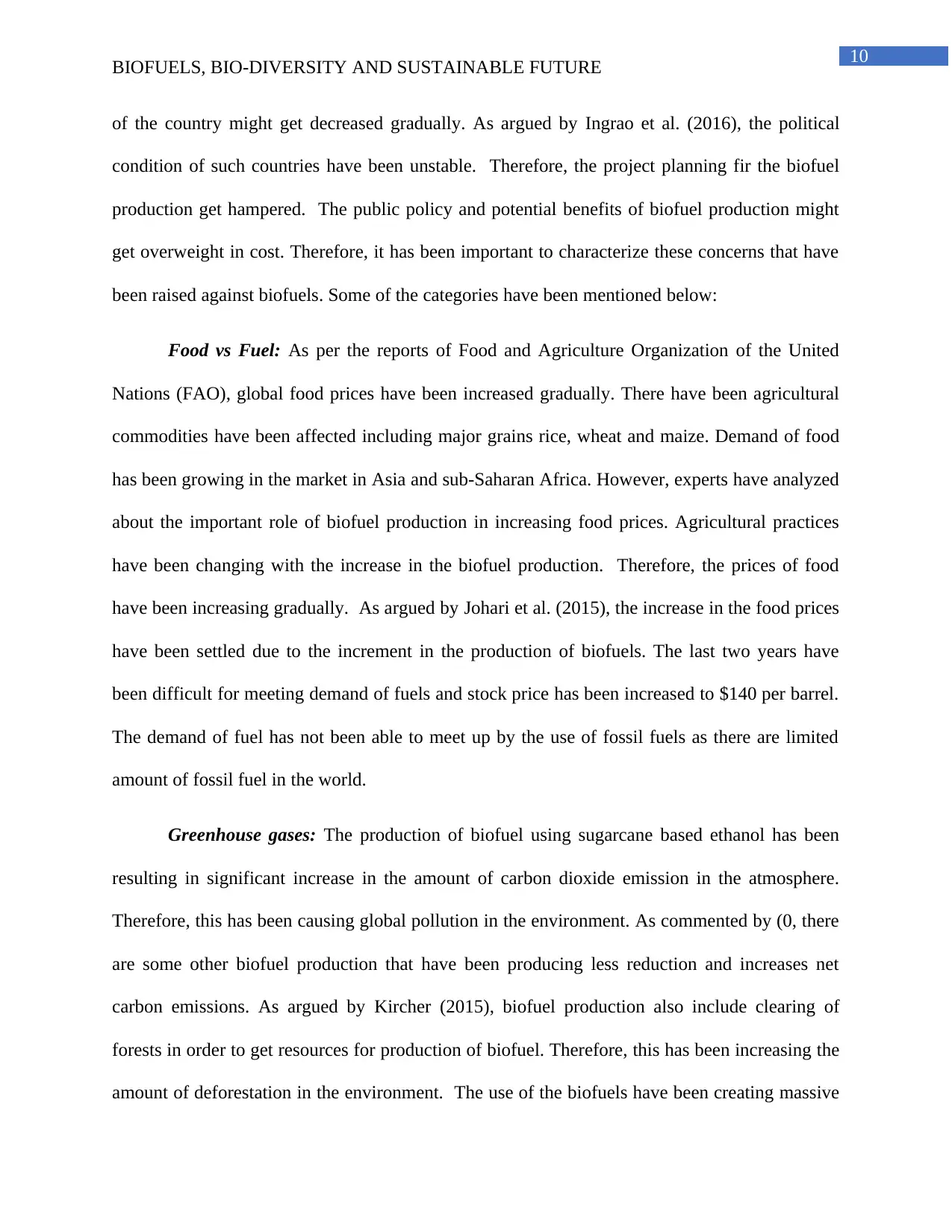
10
BIOFUELS, BIO-DIVERSITY AND SUSTAINABLE FUTURE
of the country might get decreased gradually. As argued by Ingrao et al. (2016), the political
condition of such countries have been unstable. Therefore, the project planning fir the biofuel
production get hampered. The public policy and potential benefits of biofuel production might
get overweight in cost. Therefore, it has been important to characterize these concerns that have
been raised against biofuels. Some of the categories have been mentioned below:
Food vs Fuel: As per the reports of Food and Agriculture Organization of the United
Nations (FAO), global food prices have been increased gradually. There have been agricultural
commodities have been affected including major grains rice, wheat and maize. Demand of food
has been growing in the market in Asia and sub-Saharan Africa. However, experts have analyzed
about the important role of biofuel production in increasing food prices. Agricultural practices
have been changing with the increase in the biofuel production. Therefore, the prices of food
have been increasing gradually. As argued by Johari et al. (2015), the increase in the food prices
have been settled due to the increment in the production of biofuels. The last two years have
been difficult for meeting demand of fuels and stock price has been increased to $140 per barrel.
The demand of fuel has not been able to meet up by the use of fossil fuels as there are limited
amount of fossil fuel in the world.
Greenhouse gases: The production of biofuel using sugarcane based ethanol has been
resulting in significant increase in the amount of carbon dioxide emission in the atmosphere.
Therefore, this has been causing global pollution in the environment. As commented by (0, there
are some other biofuel production that have been producing less reduction and increases net
carbon emissions. As argued by Kircher (2015), biofuel production also include clearing of
forests in order to get resources for production of biofuel. Therefore, this has been increasing the
amount of deforestation in the environment. The use of the biofuels have been creating massive
BIOFUELS, BIO-DIVERSITY AND SUSTAINABLE FUTURE
of the country might get decreased gradually. As argued by Ingrao et al. (2016), the political
condition of such countries have been unstable. Therefore, the project planning fir the biofuel
production get hampered. The public policy and potential benefits of biofuel production might
get overweight in cost. Therefore, it has been important to characterize these concerns that have
been raised against biofuels. Some of the categories have been mentioned below:
Food vs Fuel: As per the reports of Food and Agriculture Organization of the United
Nations (FAO), global food prices have been increased gradually. There have been agricultural
commodities have been affected including major grains rice, wheat and maize. Demand of food
has been growing in the market in Asia and sub-Saharan Africa. However, experts have analyzed
about the important role of biofuel production in increasing food prices. Agricultural practices
have been changing with the increase in the biofuel production. Therefore, the prices of food
have been increasing gradually. As argued by Johari et al. (2015), the increase in the food prices
have been settled due to the increment in the production of biofuels. The last two years have
been difficult for meeting demand of fuels and stock price has been increased to $140 per barrel.
The demand of fuel has not been able to meet up by the use of fossil fuels as there are limited
amount of fossil fuel in the world.
Greenhouse gases: The production of biofuel using sugarcane based ethanol has been
resulting in significant increase in the amount of carbon dioxide emission in the atmosphere.
Therefore, this has been causing global pollution in the environment. As commented by (0, there
are some other biofuel production that have been producing less reduction and increases net
carbon emissions. As argued by Kircher (2015), biofuel production also include clearing of
forests in order to get resources for production of biofuel. Therefore, this has been increasing the
amount of deforestation in the environment. The use of the biofuels have been creating massive
Paraphrase This Document
Need a fresh take? Get an instant paraphrase of this document with our AI Paraphraser
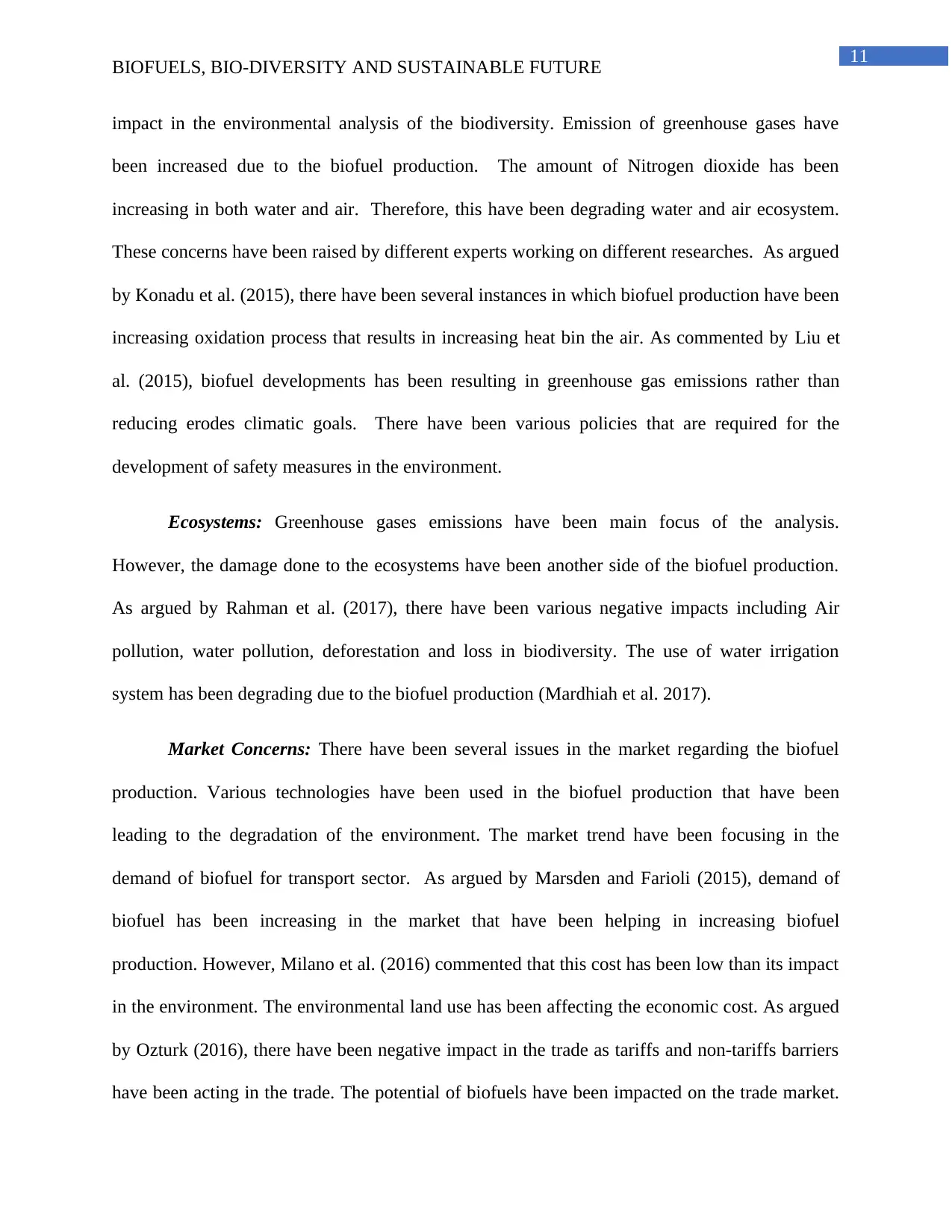
11
BIOFUELS, BIO-DIVERSITY AND SUSTAINABLE FUTURE
impact in the environmental analysis of the biodiversity. Emission of greenhouse gases have
been increased due to the biofuel production. The amount of Nitrogen dioxide has been
increasing in both water and air. Therefore, this have been degrading water and air ecosystem.
These concerns have been raised by different experts working on different researches. As argued
by Konadu et al. (2015), there have been several instances in which biofuel production have been
increasing oxidation process that results in increasing heat bin the air. As commented by Liu et
al. (2015), biofuel developments has been resulting in greenhouse gas emissions rather than
reducing erodes climatic goals. There have been various policies that are required for the
development of safety measures in the environment.
Ecosystems: Greenhouse gases emissions have been main focus of the analysis.
However, the damage done to the ecosystems have been another side of the biofuel production.
As argued by Rahman et al. (2017), there have been various negative impacts including Air
pollution, water pollution, deforestation and loss in biodiversity. The use of water irrigation
system has been degrading due to the biofuel production (Mardhiah et al. 2017).
Market Concerns: There have been several issues in the market regarding the biofuel
production. Various technologies have been used in the biofuel production that have been
leading to the degradation of the environment. The market trend have been focusing in the
demand of biofuel for transport sector. As argued by Marsden and Farioli (2015), demand of
biofuel has been increasing in the market that have been helping in increasing biofuel
production. However, Milano et al. (2016) commented that this cost has been low than its impact
in the environment. The environmental land use has been affecting the economic cost. As argued
by Ozturk (2016), there have been negative impact in the trade as tariffs and non-tariffs barriers
have been acting in the trade. The potential of biofuels have been impacted on the trade market.
BIOFUELS, BIO-DIVERSITY AND SUSTAINABLE FUTURE
impact in the environmental analysis of the biodiversity. Emission of greenhouse gases have
been increased due to the biofuel production. The amount of Nitrogen dioxide has been
increasing in both water and air. Therefore, this have been degrading water and air ecosystem.
These concerns have been raised by different experts working on different researches. As argued
by Konadu et al. (2015), there have been several instances in which biofuel production have been
increasing oxidation process that results in increasing heat bin the air. As commented by Liu et
al. (2015), biofuel developments has been resulting in greenhouse gas emissions rather than
reducing erodes climatic goals. There have been various policies that are required for the
development of safety measures in the environment.
Ecosystems: Greenhouse gases emissions have been main focus of the analysis.
However, the damage done to the ecosystems have been another side of the biofuel production.
As argued by Rahman et al. (2017), there have been various negative impacts including Air
pollution, water pollution, deforestation and loss in biodiversity. The use of water irrigation
system has been degrading due to the biofuel production (Mardhiah et al. 2017).
Market Concerns: There have been several issues in the market regarding the biofuel
production. Various technologies have been used in the biofuel production that have been
leading to the degradation of the environment. The market trend have been focusing in the
demand of biofuel for transport sector. As argued by Marsden and Farioli (2015), demand of
biofuel has been increasing in the market that have been helping in increasing biofuel
production. However, Milano et al. (2016) commented that this cost has been low than its impact
in the environment. The environmental land use has been affecting the economic cost. As argued
by Ozturk (2016), there have been negative impact in the trade as tariffs and non-tariffs barriers
have been acting in the trade. The potential of biofuels have been impacted on the trade market.
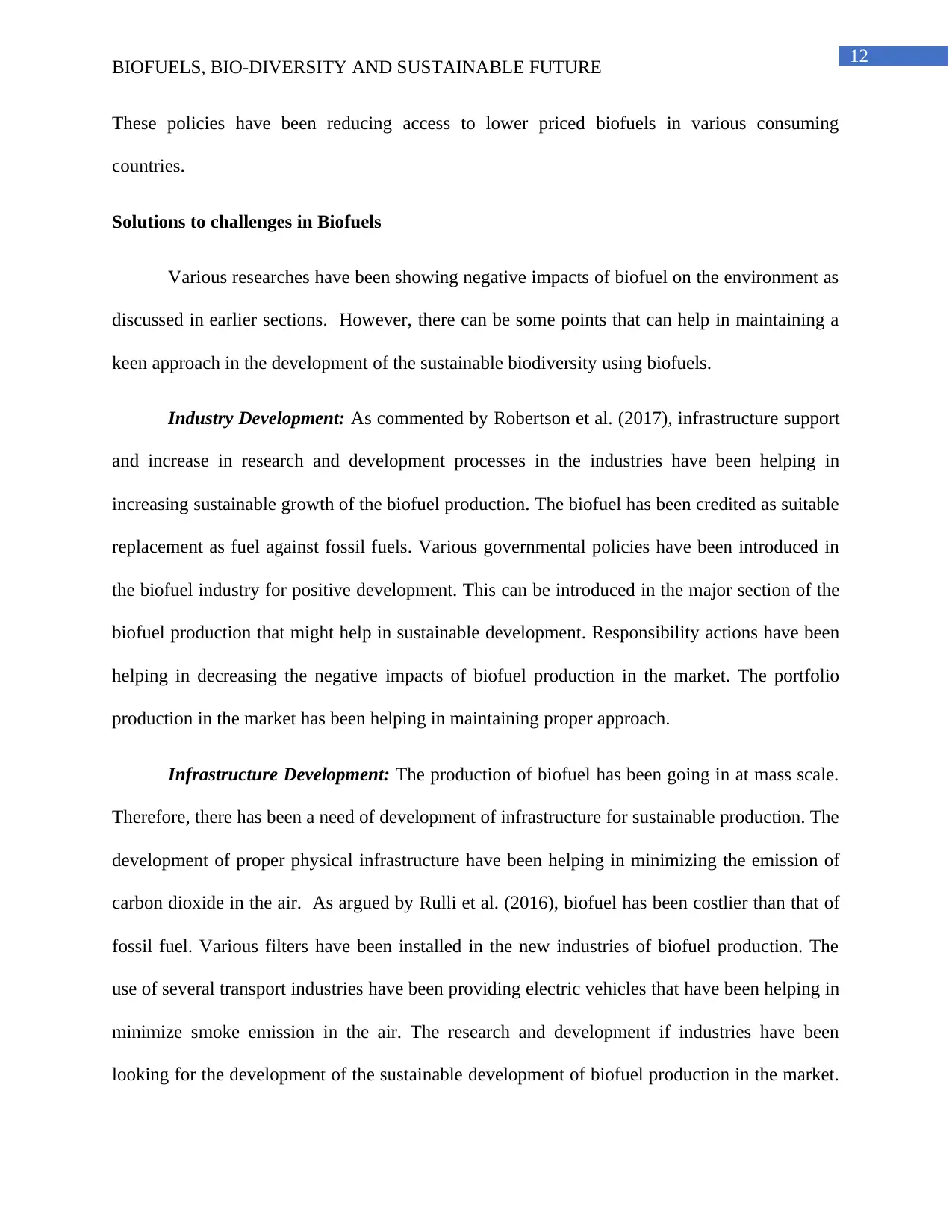
12
BIOFUELS, BIO-DIVERSITY AND SUSTAINABLE FUTURE
These policies have been reducing access to lower priced biofuels in various consuming
countries.
Solutions to challenges in Biofuels
Various researches have been showing negative impacts of biofuel on the environment as
discussed in earlier sections. However, there can be some points that can help in maintaining a
keen approach in the development of the sustainable biodiversity using biofuels.
Industry Development: As commented by Robertson et al. (2017), infrastructure support
and increase in research and development processes in the industries have been helping in
increasing sustainable growth of the biofuel production. The biofuel has been credited as suitable
replacement as fuel against fossil fuels. Various governmental policies have been introduced in
the biofuel industry for positive development. This can be introduced in the major section of the
biofuel production that might help in sustainable development. Responsibility actions have been
helping in decreasing the negative impacts of biofuel production in the market. The portfolio
production in the market has been helping in maintaining proper approach.
Infrastructure Development: The production of biofuel has been going in at mass scale.
Therefore, there has been a need of development of infrastructure for sustainable production. The
development of proper physical infrastructure have been helping in minimizing the emission of
carbon dioxide in the air. As argued by Rulli et al. (2016), biofuel has been costlier than that of
fossil fuel. Various filters have been installed in the new industries of biofuel production. The
use of several transport industries have been providing electric vehicles that have been helping in
minimize smoke emission in the air. The research and development if industries have been
looking for the development of the sustainable development of biofuel production in the market.
BIOFUELS, BIO-DIVERSITY AND SUSTAINABLE FUTURE
These policies have been reducing access to lower priced biofuels in various consuming
countries.
Solutions to challenges in Biofuels
Various researches have been showing negative impacts of biofuel on the environment as
discussed in earlier sections. However, there can be some points that can help in maintaining a
keen approach in the development of the sustainable biodiversity using biofuels.
Industry Development: As commented by Robertson et al. (2017), infrastructure support
and increase in research and development processes in the industries have been helping in
increasing sustainable growth of the biofuel production. The biofuel has been credited as suitable
replacement as fuel against fossil fuels. Various governmental policies have been introduced in
the biofuel industry for positive development. This can be introduced in the major section of the
biofuel production that might help in sustainable development. Responsibility actions have been
helping in decreasing the negative impacts of biofuel production in the market. The portfolio
production in the market has been helping in maintaining proper approach.
Infrastructure Development: The production of biofuel has been going in at mass scale.
Therefore, there has been a need of development of infrastructure for sustainable production. The
development of proper physical infrastructure have been helping in minimizing the emission of
carbon dioxide in the air. As argued by Rulli et al. (2016), biofuel has been costlier than that of
fossil fuel. Various filters have been installed in the new industries of biofuel production. The
use of several transport industries have been providing electric vehicles that have been helping in
minimize smoke emission in the air. The research and development if industries have been
looking for the development of the sustainable development of biofuel production in the market.
⊘ This is a preview!⊘
Do you want full access?
Subscribe today to unlock all pages.

Trusted by 1+ million students worldwide
1 out of 21
Related Documents
Your All-in-One AI-Powered Toolkit for Academic Success.
+13062052269
info@desklib.com
Available 24*7 on WhatsApp / Email
![[object Object]](/_next/static/media/star-bottom.7253800d.svg)
Unlock your academic potential
Copyright © 2020–2025 A2Z Services. All Rights Reserved. Developed and managed by ZUCOL.





